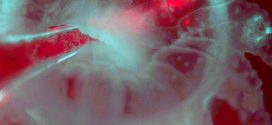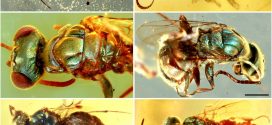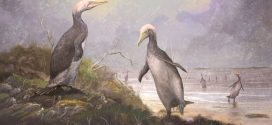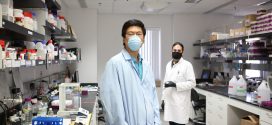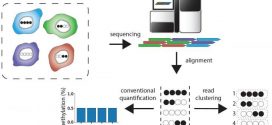Organic molecule remnants found in nuclei of 125-million-year-old dinosaur cells. A team of scientists from the Institute of Vertebrate Paleontology and Paleoanthropology (IVPP) of the Chinese Academy of Sciences and from the Shandong Tianyu Museum of Nature (STM) has isolated exquisitely preserved cartilage cells in a 125-million-year-old dinosaur from Northeast China that contain nuclei with remnants of organic molecules and …
Read More »Science
Microscope allows gentle, continuous imaging of light-sensitive corals (Study)
Using the L-SPI microscope to visualize the re-infection of an Astrangia polyp (cyan from reflected light) with algae (red from chlorophyll fluorescence), injected by pipette into the mouth of the polyp. Credit: Loretta Roberson Corals are “part animal, part plant, and part rock—and difficult to figure out, despite being studied for centuries,” says Philippe Laissue of University of Essex, a …
Read More »Florida still deadliest state for lightning as storms roll into busiest time of year (Study)
Credit: CC0 Public Domain While Florida is referred to as the Sunshine State, it could also go by the name of electric reaper given its status as the deadliest state for lightning strikes. It’s National Lightning Safety Awareness week, and with July around the corner; the month with the highest annual recorded cloud-to-ground lightning flashes, it might be a good …
Read More »Mathematical noodling leads to new insights into an old fusion problem (Study)
PPPL physicist Christopher Smiet helped produce findings that could bring fusion-produced electricity closer to being a reality. Credit: Pamela Serai A challenge to creating fusion energy on Earth is trapping the charged gas known as plasma that fuels fusion reactions within a strong magnetic field and keeping the plasma as hot and dense as possible for as long as possible. …
Read More »Geologists identify deep-earth structures that may signal hidden metal lodes (Study)
A new study shows that giant ore deposits are tightly distributed above where rigid rocks that comprise the nuclei of ancient continents begin to thin, far below the surface (white areas). Redder areas indicate the thinnest rocks beyond the boundary; bluer ones, the thickest. Circles, triangles and squares show known large sediment-hosted deposits of different metals. Credit: Adapted from Hoggard …
Read More »New mathematical idea reins in AI bias towards making unethical and costly commercial choices (Study)
Credit: CC0 Public Domain Researchers from the University of Warwick, Imperial College London, EPFL (Lausanne) and Sciteb Ltd have found a mathematical means of helping regulators and business manage and police Artificial Intelligence systems’ biases towards making unethical, and potentially very costly and damaging commercial choices—an ethical eye on AI. Artificial intelligence (AI) is increasingly deployed in commercial situations. Consider …
Read More »Amber fossils unlock true color of 99-million-year-old insects (Study)
Diverse structural-colored insects in mid-Cretaceous amber from northern Myanmar. Credit: NIGPAS Nature is full of colors, from the radiant shine of a peacock’s feathers or the bright warning coloration of toxic frogs to the pearl-white camouflage of polar bears. Usually, fine structural detail necessary for the conservation of color is rarely preserved in the fossil record, making most reconstructions of …
Read More »New Zealand’s ancient monster penguins had northern hemisphere doppelgangers (Study)
Plotopterids like these Copepteryx looked remarkably like penguins. Credit: Mark Witton. Available for media and current affairs use; all other rights reserved New Zealand’s monster penguins, which lived 62 million years ago, had doppelgangers in Japan, the U.S. and Canada, a study published today in the Journal of Zoological Systematics and Evolutionary Research has found. Scientists have identified striking similarities …
Read More »Research reveals more about path bacterial pathogen travels to cause tuberculosis (Study)
Jianjun Sun, Ph.D. left, associate professor in The University of Texas at El Paso Department of Biological Sciences, and Javier Aguilera, a doctoral student, stand in Sun’s lab in the Bioscience Research Building. The pair worked with other biology students and faculty members to detail how a bacterial protein dictates the course of the bacterial pathogen that causes tuberculosis in …
Read More »Novel software reveals molecular barcodes that distinguish different cell types (Study)
Dotted box represents a tissue sample containing four cell types. Filled and empty circles represent methylated and unmethylated CpGs, respectively. Credit: Waterland lab/Genome Biology, 2020. There are about 75 different types of cells in the human brain. What makes them all different? Researchers at Baylor College of Medicine have developed a new set of computational tools to help answer this …
Read More »Novel software reveals molecular barcodes that distinguish different cell types (Study)
Dotted box represents a tissue sample containing four cell types. Filled and empty circles represent methylated and unmethylated CpGs, respectively. Credit: Waterland lab/Genome Biology, 2020. There are about 75 different types of cells in the human brain. What makes them all different? Researchers at Baylor College of Medicine have developed a new set of computational tools to help answer this …
Read More » Canada Journal – News of the World Articles and videos to bring you the biggest Canadian news stories from across the country every day
Canada Journal – News of the World Articles and videos to bring you the biggest Canadian news stories from across the country every day

